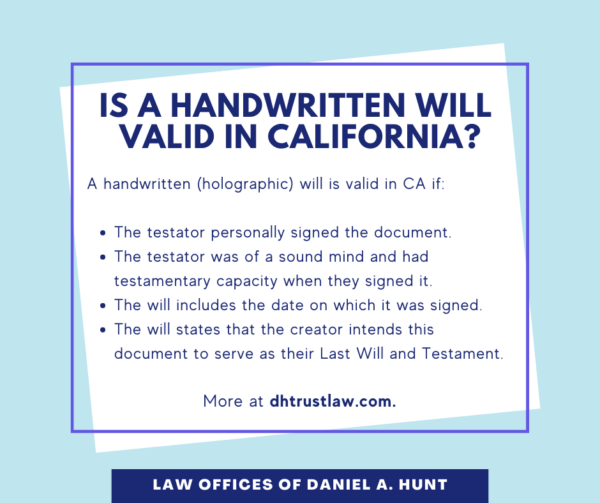Is a Handwritten Will Valid in California?

Is a handwritten will valid in California? Our office is often asked this question when a loved one has died, a family member has discovered a handwritten will, and they want to know if the Probate Court will accept it. Under certain circumstances, a handwritten will is valid under California law.
Requirements for Handwritten Wills to Be Valid
The requirements for a handwritten will (also known as a holographic will) to be valid are outlined in Section 6111 of the California Probate Code. In order to create any type of will, a person must be at least 18 years old and “of a sound mind”.
A holographic will can be handwritten or a commercially printed or internet will form, but it must be signed by the testator in their own handwriting. The will does not necessarily need to be witnessed or notarized when it was signed in order to be valid.
In order for a holographic will to be valid in California:
- The testator must personally sign the will.
- The testator must be of a sound mind and have testamentary capacity when they sign the document.
- The will must include the date on which it was signed.
- The will must state that the creator intends this document to serve as their Last Will and Testament.
When is a Handwritten Will Invalid?
Now that we’ve covered what makes a holographic will valid, we need to address what would make it invalid. A holographic will is considered invalid if:
- The testator lacked mental capacity when they signed it.
- A third party persuaded the decedent to change their will to favor themself.
- Someone besides the creator forged the signature on the will.
- The will was not dated.
- A newer version of the will has been discovered, which was meant to replace the original document.
In any of these situations, the probate court could reject the holographic will and either accept a different document or declare the decedent to have died “intestate”, meaning without a valid will. Without a valid will, the estate would be administered according to the laws of intestate succession and distributed to the decedent’s nearest living relatives.
Challenges with Holographic Wills
While holographic wills may be valid in California, they’re never ideal. Estate planning documents prepared by an experienced estate planning attorney are far superior to a holographic will and far less likely to be challenged and overturned in court.
Some of the common problems with holographic wills include:
- Illegible handwriting in the document, which can cause confusion over the creator’s intent, mental capacity, and the authenticity of the signature
- Ambiguous language in the document which creates confusion concerning the creator’s intent
- Omission of important details in the document
- Lack of a date on the will, especially if there is a second will that does include a date
- A date of execution that occurred when the will creator lacked mental capacity
All of these complicating factors can result in expensive legal battles when the testator passes away. If you’re involved in a will contest that involves a holographic will, you should seek legal counsel from an experienced estate litigation attorney.
Often people who create a handwritten will don’t think their estate is large enough to merit a more formal estate plan, or they procrastinated until it was too late and are trying to throw together a will before they pass. No matter what your estate size, plan ahead and seek advice from an experienced estate planning attorney when preparing an estate plan to avoid potential litigation and family conflict.
For questions about handwritten wills or creating a professional estate plan, feel free to contact our law firm.
Law Offices of Daniel A. Hunt
The Law Offices of Daniel A. Hunt is a California law firm specializing in Estate Planning; Trust Administration & Litigation; Probate; and Conservatorships. We've helped over 10,000 clients find peace of mind. We serve clients throughout the greater Sacramento region and the state of California.




